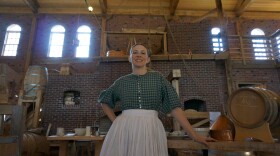This week on WYSO Curious, we tackle a tough topic: vaccinations. Scott Croshier of Yellow Springs asked, “to what extent is Yellow Springs’ embrace of alternative medicine accompanied by a rejection of vaccination among local parents?”
And the question is timely: Mills Lawn Elementary School in Yellow Springs has been getting some unwanted attention lately because of the revelation that its kindergarten class has the highest percentage of students who have received exemptions from vaccinations in Ohio.
What’s the big deal?
Out on the playground, parents aren’t shocked by the news.
“I don’t think it’s very surprising, to be honest,” says Molly Lunde, a Mills Lawn parent. “There are some strong voices in support of not vaccinating.”
Lunde debated immunizations and decided against having her children fully vaccinated on schedule. She found it easy to say “yes” to some vaccines, like the one for whooping cough. But she was nervous about others, like the Measles, Mumps, and Rubella vaccine—or MMR.
“I was concerned about it for sure,” she says. “Polio as well, because they were not necessarily diseases that were so rampant. And I realize they’re not rampant now because of continued vaccinations.”
Lunde says at this point she probably will complete her children’s vaccinations, but she’s just one of many parents who delay vaccinations—or turn them down altogether.
39 percent of the kindergarten class is notfully vaccinated, and most of those families (29 percent) signed a form that grants exemption from all vaccinations on religious or philosophical grounds. The state requires parents to get exemptions, but most exemptions are granted without question.
The high unvaccinated rate is an issue because if one kid comes to school sick, a whole bunch may get sick. Health officials say anything over 5 percent unvaccinated becomes risky. So, Yellow Springs’ 39 percent stands out.
Vaccination Vacillation
“If I look at this from a science standpoint, it’s very surprising,” says Dr. Paul Hershberger, a psychologist and professor of family medicine at Wright State, referring to Yellow Springs’ vaccination numbers.
“It’s like, if these parents are well educated, how in the world could they choose to not immunize their child going against very solid medical recommendations?” Hershberger asks. “On the other hand, if there seems to be a trend in a given community for parents to not have their children vaccinated, then this thing can take on a life of its own in a community.”
But how and why does a trend like this begin? Scott Croshier asked WYSO Curious if Yellow Springs’ embrace of natural medicine plays a role in vaccination decisions, and Hershberger says it probably does. Likewise, the doctor says parents who distrust government agencies, like the Centers for Disease Control, and big businesses, like pharmaceutical companies, could be less likely to vaccinate their children.
In the end, though, he says it comes down to the fact that decision making isn’t always logical. For example, a horror story that links vaccines to autism will stick with us, even after it’s been debunked, and if we fear vaccines already, we’ll favor stories that confirm our fears.
“We’re most susceptible to errors in thinking when we’re uncertain or when there’s a lot emotion involved,” says Hershberger. “And, obviously, with your child, that’s a very emotional kind of decision.”
Something To Talk About
“I look at it from two angles,” says Yellow Springs School Superintendent Mario Basora. “As a parent, I feel like parents should have some choice in terms of the decisions they make. But I also think those choices should be informed choices based on factual, scientific evidence. So, part of what we’d like to do is try to give parents the opportunity to have that evidence and have some dialog and figure out the way going forward.”
Basora is aware of the risks the low vaccination rates could present. When asked to consider what it would be like if a student came back from break with measles or mumps, he says, “we don’t even want to go there. It’d be horrible.”
He says he would like to see vaccination rates increase, and he hopes to bring in a speaker on the subject. But he may find it hard to start a dialog.
Most parents are willing to talk about vaccines, but a lot of them don’twant to be recorded for this story. Parents on both sides are afraid of upsetting their neighbors.
“I know people that are staunch anti-vaccines and people who are strong health care professionals and scientists that support it,” says Janet Muller, on her way to pick up kids at Mills Lawn. “So, it’s challenging living in a community where people feel so much like this is… It’s like religion almost. It’s like so, so deep. And so I feel like that’s the question: how do we help people on opposite sides of the spectrum have conversations where they don’t feel like they hate each other?”
If nothing else, it seems much of the community wants a dialog, even if no one reallywants to speak first.
WYSO Curious is our series driven by your questions and curiosities about the Miami Valley. Is there something you’ve always wondered about the Miami Valley’s history, people, culture, economy, politics or environment? Send in a question now, and check back to see which questions we’re considering. WYSO Curious is a partner of WBEZ's Curious City, which was founded by Jennifer Brandel and is one of ten Localore productions brought to life by AIR.
Jason Reynolds is a 2014 graduate of WYSO's Community Voices class and an Assistant Professor at Southern State Community College.
_







